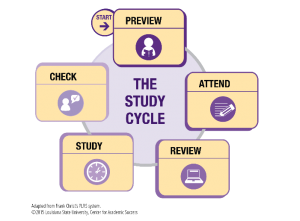Time for finals! Make study time effective
Have you ever received a test back from the professor and panicked in disbelief at the grade stamped on the page? Does that letter adequately represent the amount of time and effort you spent preparing for the exam? Have you found yourself saying, “But, I spent so much time studying! How did I not get an A?” Well, you’re not alone.
There’s a saying in academics: “If you go to school full time, treat it like a full-time time job.” To be successful in college courses, a student needs to spend three hours studying out-of-class for every one hour spent in class. So when you’re logging those hours, it’s imperative to make your study time effective.
Try a new approach
Many students enter college without a well-developed repertoire of study habits. They’re putting in the time, but not getting the desired results. That’s because not all time spent in front of a book is doing you good. Often, students read too much in one sitting and try to read the chapter start to finish in hopes of retaining all the important information. Unfortunately, our brains don’t work that way. We need to process information in small amounts over short periods. Two study methods that help in the process of breaking up and absorbing the information are Dr. Saundra Yancy-Maquire’s “Study Cycle” and the “SQ5R” reading technique.
The “Study Cycle” is a repeatable study method that teaches students how to spread the learning out over multiple study sessions. It looks like this:
• Preview. Before class, skim the chapter, review key terms and objectives, note any questions you would like answered in class.
• Attend. Go to class; takes notes; ask questions.
• Review. Within 24 hours of class, go back over the lecture notes, fill in any gaps, and identify questions that still need answers.
• Study. Study in short, intense sessions 3-5 times as day. Space out the learning; you can’t learn it all in one sitting.
• Assess. Ask questions to evaluate what you’ve learned. Am I using the study methods effectively? Do I know this material well-enough to teach it to someone else?
• Repeat. While in the study phase of the cycle, utilize Dr. Yancy-Maguire’s “SQ5R” reading technique in order to process the information presented in the chapter more efficiently.
• Survey. Review the objectives, summaries, and bold print or italicized words before reading the chapter.
• Question. Devise questions you think the reading will answer.
• Read. One paragraph at a time.
• Recite. Summarize (paraphrase) the paragraph in your own words.
• Record or wRite. Annotate your summary of the paragraph in the margins of the text book or in your notebook.
• Review. Summarize the information in your words. Speak it outload. Teach your dog or cat all about microbiology.
• Reflect. Look back at what you have read and identify any remaining questions.
These are two techniques you may find helpful, but I encourage you all to see what else is out there and what works best for you. For more information about our new QEP initiative, Ready, Set, Succeed, you can view our web site at qep.spcollege.edu.


